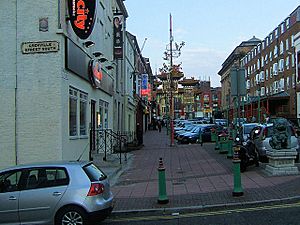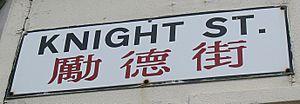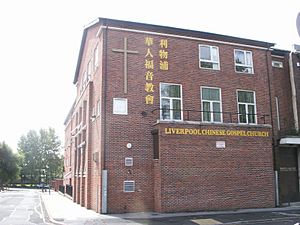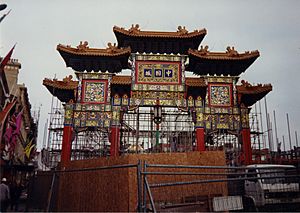Chinatown, Liverpool facts for kids
Quick facts for kids Liverpool Chinatown |
|
|---|---|
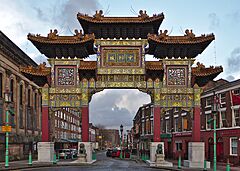 Chinatown Gate, Nelson Street |
|
| Metropolitan borough | |
| Metropolitan county | |
| Region | |
| Country | England |
| Sovereign state | United Kingdom |
| Post town | LIVERPOOL |
| Postcode district | L1 |
| Dialling code | 0151 |
| Police | Merseyside |
| Fire | Merseyside |
| Ambulance | North West |
| EU Parliament | North West England |
| UK Parliament |
|
| Liverpool Chinatown | |||||||||||||
|---|---|---|---|---|---|---|---|---|---|---|---|---|---|
| Traditional Chinese | 利物浦中國城 | ||||||||||||
| Simplified Chinese | 利物浦中国城 | ||||||||||||
|
|||||||||||||
| Alternative Chinese name | |||||||||||||
| Chinese | 利物浦唐人街 | ||||||||||||
|
|||||||||||||
Chinatown in Liverpool, England, is a special area. It is home to the oldest Chinese community in all of Europe! Located in the south of the city centre, Chinatown is full of Chinese shops, restaurants, and supermarkets. It also has places that help the Chinese community. This area is famous for its amazing Chinese-style buildings. The huge paifang (a traditional Chinese archway) on Nelson Street is the biggest of its kind outside of China.
Contents
History of Liverpool's Chinese Community
How Chinatown Started
The first Chinese people arrived in Liverpool in 1834. This was when the first ship came directly from China to Liverpool's docks. They came to trade things like silk and cotton. More Chinese immigrants came in the late 1860s. This happened because a shipping company called Alfred Holt and Company hired many Chinese sailors. This company, the Blue Funnel Shipping Line, created strong trade links. They connected cities like Shanghai and Hong Kong with Liverpool. They mainly brought in silk, cotton, and tea.
From the 1890s, some Chinese people started businesses. These businesses served the Chinese sailors. Some of these men married British women. This led to many British-born people of mixed Chinese and European heritage being born in Liverpool.
Chinatown During World War II
At the start of World War II, about 20,000 Chinese sailors lived in Liverpool. In 1942, these sailors wanted fair pay and rights. They wanted the same pay as other sailors. This disagreement lasted for four months. The ship owners and the British Government saw these men as "troublemakers."
After the war, these sailors were not allowed to work on shore. Their pay was cut a lot. They were only offered one-way trips back to China. Hundreds of men had to leave their families. Many of their children, born in Liverpool, still live in and around Chinatown today.
Liverpool's first Chinatown was near the city's docks. But heavy bombing during World War II destroyed much of it. So, Chinatown moved to its current spot. This new location is just west of Liverpool Cathedral.
Bringing New Life to Chinatown
The famous Chinese Arch was put together in 2000. It was actually built in Shanghai, one of Liverpool's twin cities. The arch was a sign of new life and development for the area. This redevelopment is still happening today.
Big plans to improve Chinatown were shared in 2010 and 2012. One plan, called 'China Square,' will include a Chinese Cultural Museum. It will also have a Courtyard by Marriott hotel in an old building. Another project is 'Shanghai Square.' This will be built on the southern edge of Chinatown. It will have a large trade centre for up to 100 businesses. There will also be special homes for Chinese students. Plus, a big Asian Pacific food market will be built.
Exploring Chinatown's Location
The Chinatown in Liverpool is located near the southern edge of the city centre. It is very close to Liverpool Cathedral. Over time, the Chinatown area has grown a lot. It now covers much of Berry Street. The streets in Liverpool's Chinatown are decorated with Chinese-style lanterns. Even the waste bins are in a Chinese style. All street signs are written in both English and Chinese.
Street Names in Chinatown
| English name | Chinese name | Romanisation | ||
|---|---|---|---|---|
| Simplified | Traditional | Mandarin (Pinyin) |
Cantonese (Jyutping) |
|
| Bailey Street | 贝利街 | 貝利街 | Bèilì Jiē | bui3 lei6 gaai1 |
| Berry Street | 巴利街 | 巴利街 | Bālì Jiē | baa1 lei6 gaai1 |
| Cornwallis Street | 康和利士街 | 康和利士街 | Kānghélìshì Jiē | hong1 wo4 lei6 si6 gaai1 |
| Cummings Street | 卡明斯街 | 卡明斯街 | Kǎmíngsī Jiē | kaa1 ming4 si1 gaai1 |
| Duke Street | 公爵街 | 公爵街 | Gōngjué Jiē | gung1 zoek3 gaai1 |
| Griffiths Street | 居富士街 | 居富士街 | Jūfùshì Jiē | geoi1 fu3 si1 gaai1 |
| Knight Street | 励德街 | 勵德街 | Lìdé Jiē | lai6 dak1 gaai1 |
| Nelson Street | 纳尔逊街 | 納爾遜街 | Nà'ěrxùn Jiē | naap6 ji6 seon3 gaai1 |
| Roscoe Lane | 罗士高里 | 羅士高里 | Luóshìgāo Lǐ | lo4 si6 gou1 lei5 |
| Sankey Street | 桑基街 | 桑基街 | Sāngjī Jiē | song1 gei1 gaai1 |
| Seel Street | 兆街 | 兆街 | Zhào Jiē | siu6 gaai1 |
| Upper Duke Street | 上公爵街 | 上公爵街 | Shàng Gōngjué Jiē | soeng6 gung1 zoek3 gaai1 |
Who Lives in Chinatown?
In 2007, it was estimated that 1.7% of Liverpool's population was of full Chinese descent. That's about 7,400 people! This makes Chinese people the largest non-White ethnic group in the city. However, another group, the International Organization for Migration, thinks the number of Chinese people in Liverpool could be much higher. They estimate it could be between 25,000 and 35,000.
There are also many people in Liverpool who are of mixed European and Chinese background. These are the descendants of the first Chinese settlers in the city. Liverpool's universities also have many Chinese students. The University of Liverpool has more Chinese students than any other university in the UK.
Chinatown's Economy and Businesses
Chinatown is home to many Chinese-owned businesses. You can find restaurants, supermarkets like Chung Wah and Hondo, and book shops. These businesses are now spread throughout the district. The growing number of Chinese students has also led to new businesses. These new shops and services meet the needs of students from Mainland China. They add to the already busy Chinatown.
Culture and Community Life
Community Places
Chinatown is also a hub for many community groups. It is home to the Liverpool Chinese Gospel Church. You can also find the Liverpool Chinese Christian Disciples Church here. These places help bring the community together.
Famous Landmarks in Chinatown
The Amazing Chinese Arch
Plans for the huge arch began in 1992. It was part of a plan by Liverpool City Council to improve the Chinatown area. The local Chinese community helped choose the design for the arch through a competition.
Building the arch started in October 1999. A company from Liverpool, Dowhigh Civil Engineering, was the main builder. Twenty special craftsmen came from Shanghai, Liverpool's twin city. These skilled workers included stonemasons and stone carvers. They also had painters and construction engineers. Along with the Chinese workers, parts of the arch were shipped from China. These parts came in five big containers, with 2,000 pieces!
The whole design was managed by an architectural firm. Liverpool City Council helped with the engineering and oversaw the building. The work finished very quickly, in just 90 days. This was because the Chinese workers do not traditionally celebrate Christmas and Boxing Day. So, they could keep working. The arch was finished in 2000. It was officially opened on Chinese New Year. The final cost was about £700,000.
The arch stands at 13.5 metres (about 44 feet) high. This makes it the tallest Chinese arch in Europe. It is also the second tallest in any Chinatown outside mainland China. (The one in Washington D.C. is the tallest outside China.) The arch has 200 hand-carved dragons. 188 are regular dragons, and 12 are "pregnant" dragons. This symbolizes good luck and fortune between Liverpool and Shanghai.
The words "Chinatown" (中國城) are written on the centre of the arch. They are written from right to left using traditional Chinese characters. In 2010, new colourful, energy-saving lights were added to the arch. This £25,000 lighting scheme helps to show off one of Liverpool's most important structures.
 | Misty Copeland |
 | Raven Wilkinson |
 | Debra Austin |
 | Aesha Ash |


